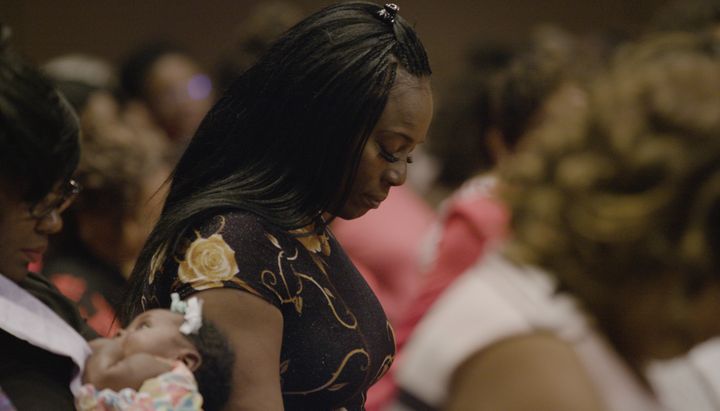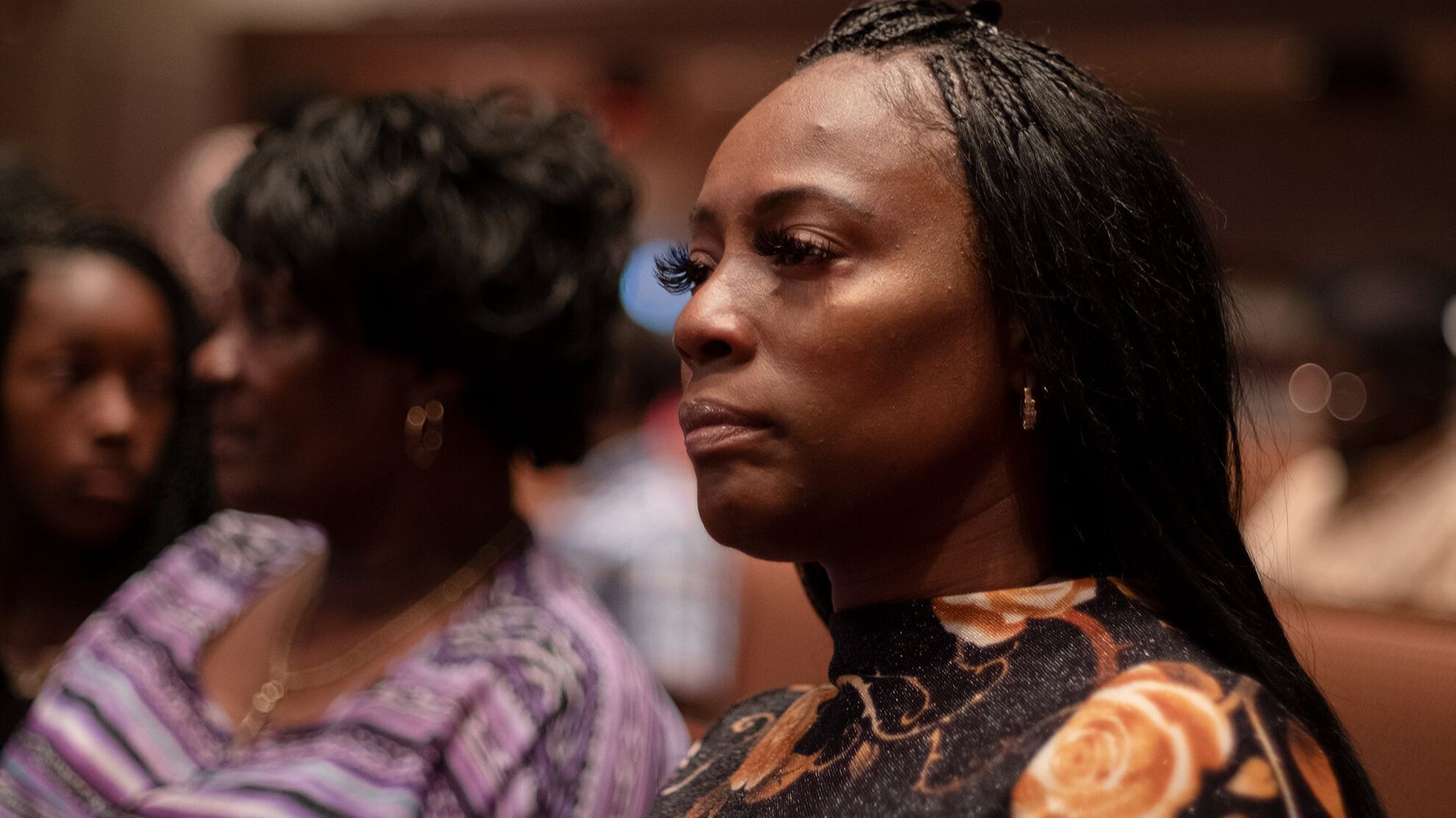[ad_1]
RENDON, Texas ― If Crystal Mason’s mom doesn’t cook for their big family on Sundays, Mason stops at a tiny doughnut store on the way to church in Dallas, just off the road, to get breakfast for everyone.
Sunday, a scorching day in early September that reached triple digits, was a doughnut day.
Mason ordered a dozen pigs-in-a-blanket, two dozen doughnut holes for her family of about 12 — a combination of children, nephews, nieces and grandchildren she has raised. As she was getting ready to pay, she paused and decided to order a dozen more chocolate-flavored ones. Her boys are always hungry, she said, and would eat more.
Soon, Mason’s Sunday routine might disappear. Last year, she was convicted of illegally voting in the 2016 election and sentenced to five years in prison. On Tuesday, her lawyers will appear before three Republican judges on the Texas Court of Appeals, argue that she was wrongly convicted and ask for a new trial.
If the Texas Court of Appeals denies Mason’s request on Tuesday, she will appeal to the Texas Court of Criminal Appeals, the state’s highest criminal court.
They don’t want folks who look like Crystal to show up at the polls.
Kim Cole, an attorney for Crystal Mason
Mason had no idea she couldn’t vote three years ago. Texas prohibits convicted felons from voting while they’re serving their sentences, and in 2016, Mason was on supervised release for a felony. When a 16-year-old poll worker couldn’t find her name on the rolls on Election Day, he offered her the chance to vote with a provisional ballot. Mason filled out an affidavit, submitted it, and ultimately, election officials rejected it because she was ineligible.
Even though her ballot didn’t count, prosecutors brought charges against Mason and, after a bench trial that lasted just a few hours, successfully convinced a judge she had knowingly voted illegally. The severity of her sentence made national news.
Civil rights groups and other activists have held up Mason’s case as an egregious example of voter suppression. Mason obviously made a mistake, they say, and is being severely punished to intimidate minorities and people with a criminal record from voting.
“Crystal’s case is an effort in voter suppression. This has nothing to do with whether or not she was eligible to vote,” Kim Cole, one of Mason’s attorneys, said to the nearly all-Black congregation at Mason’s church on Sunday. “They don’t want folks who look like Crystal to show up at the polls.”

Mason’s attorneys recognize they face a significant challenge in convincing Republican judges in a Republican county to rule in Mason’s favor.
“We are facing a panel of elected judges that are all Republicans in an appeals court that has been Republican-held since the ’80s,” Alison Grinter, another one of Mason’s attorneys, said in an interview Monday.
“We are bringing a case that basically suggests an existential threat to Republican governance in that part of Texas,” she said. “I think it’s going to be difficult … I have no reason to believe that we won’t find judges who will place the law above partisanship.”
Mason isn’t the only one who has faced a prison sentence for unknowingly voting while ineligible. Rosa Ortega, also a Tarrant County resident, received an eight-year sentence in 2017 for illegally voting as a noncitizen, even though she said she didn’t know she couldn’t vote.
Elsewhere in Texas, two women were sentenced to jail time last year for improperly assisting voters with mail-in ballots. In North Carolina, a local prosecutor chose to bring charges against several people with felony convictions who unknowingly voted illegally.
Making An Example Of Mason
Tarrant County District Attorney Sharen Wilson (R), who chose to bring charges against Mason, denies the case has anything to do with voter intimidation.
“The only ones who have ever tried to politicize this case are Mason and her representatives. No one has anything to fear from our office unless the person chooses to break the law,” Wilson said in a statement earlier this year.
Prosecutors don’t dispute probation officials failed to tell Mason she couldn’t vote. But the evidence used to convict Mason is shaky, a HuffPost investigation found. Two poll workers, the key prosecution witnesses during the trial, testified that Mason appeared to read over the provisional ballot affidavit before signing it. But both men, who were also Mason’s neighbors, had different recollections about what happened at the polls in 2016, raising questions about whether Mason actually read the language.
Jarrod Streibich, the 16-year-old poll worker who checked Mason in at the polls, told HuffPost he knew she was ineligible to vote, but it just slipped his mind when she walked into the polling place.
Wilson’s decision to prosecute Mason’s case is unusual. According to records obtained by HuffPost, 3,990 of the 4,500 people who cast provisional ballots in Tarrant County, where Mason lives, had their ballots rejected during the 2016 election. Mason was the only one of those thousands of people the district attorney singled out.
We are bringing a case that basically suggests an existential threat to Republican governance in that part of Texas.
Alison Grinter, an attorney for Mason
The case came to the attention of the district attorney after Mason’s election judge (also Mason’s neighbor and the GOP precinct chair) called Wilson after the election. It’s unclear if the case would have been prosecuted if that neighbor did not contact the district attorney’s office.
Mason’s lawyers argue in their appeals briefs that Mason was wrongly convicted because she didn’t actually “vote” ― she submitted a provisional ballot that ultimately didn’t count. They dispute that Mason was ineligible to vote while she was on supervised release and that she knowingly cast an illegal ballot.
Provisional ballots are a federally required safeguard for people who show up at the polls and are unsure of their registration status. People vote provisionally for many reasons ― they may have missed the voter registration, for example, or may have showed up at the wrong polling place.
If prosecutors were to start bringing charges against people who voted provisionally, Mason’s lawyers say, it would deter people from exercising their legal right to vote a provisional ballot.
Voter fraud is extremely rare in the United States. But over the last two decades, conservative groups have used rare instances to stoke fears and justify new voting restrictions. After the 2016 election, President Donald Trump amplified that strategy, saying without evidence that millions of people voted illegally in the presidential election.
Mason’s case is perhaps the most severe example of the consequences of that rhetoric, underscoring how a prosecutor can twist confusion about voting qualifications to make something look like a nefarious illegal act.
Even though Mason is appealing her five-year prison sentence, she and her family have already suffered severe consequences because of her conviction. When Mason was found guilty of the voting crime while on supervised release for her federal case, she was sent back to federal prison from September 2018 until May of this year.
When Mason went to prison, her family of about 12 lost their main breadwinner and nearly lost their home to foreclosure. Mason’s daughter, Taylor, 20, became responsible for running the household and paying all of the bills. They relied in part on donations from a GoFundMe page to stay afloat.
Keeping Faith
On Sunday, Mason led her family into church, where they nearly filled up two pews. Mason sat on one end while the kids sat farther away, whispering and occasionally taking out iPhones, a churchgoing no-no. At some point during the service, Mason took them away.
During the service, the pastor, Frederick Haynes, talked about Mason’s case repeatedly and asked the congregants to pray for her. Whatever the judges said on Tuesday, Haynes reminded them, there was another judge ― God ― who would say “overruled.”
Mason says her faith has anchored her deeply over the last year and is the reason why she speaks so confidently about her case. If you want something to happen, she says, you have to speak it into the universe.
Maybe it’s because of this faith that Mason believes so deeply that the criminal justice system — the same system that failed to distinguish her mistake from an illegal vote, and the same system that sent her back to federal prison for several months — will exonerate her on Tuesday.
“I’m just trusting that they’re going to do their job,” she said in the car on the way to church. “So I’m OK. I’m just completely OK with everything.”
If she has to go back to prison, she said, she’ll go with her head held high.
Want to learn more about voting rights? Listen to “Shut Out,” HuffPost’s three-part podcast about the fight to vote in America. Subscribe wherever you get your podcasts.
REAL LIFE. REAL NEWS. REAL VOICES.
Help us tell more of the stories that matter from voices that too often remain unheard.
[ad_2]
Source link

